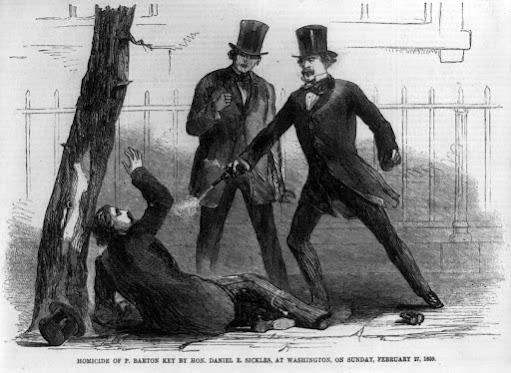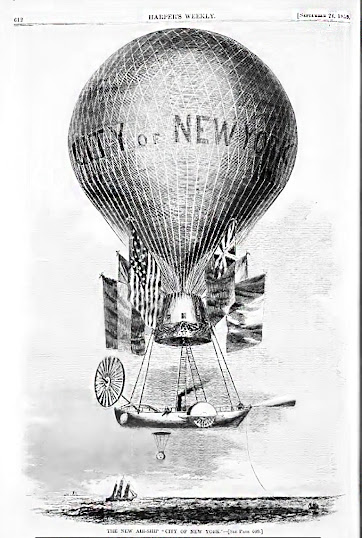Murder in Front of the White House --February 1859
Murder in Front of the White House --February 27,1859
The Honorable Daniel E. Sickels (D-NY) murdered the DC
Federal Attorney, Philip Barton Key II in broad daylight in front of the White House. Key, son of the composer of the Star Spangled
Banner, a widower with four children, was known as the most handsome and eligible bachelor in town.
At least a dozen witnesses testified Sickels shot Key
several times using two of the three pistols he carried. Sickels himself
immediately confessed to the murder to the Assistant DC Federal Attorney.
It took the jury almost no time to acquit Sickels.
He was the first person to use the temporary insanity plea
in America.
"Scoundrel" would have been a great first, middle, and last
name for Daniel Edgar Sickels. He lived to be 94, so had ample time to be involved
in too many scandals to cover in one blog entry.
Sickels claimed news of his wife’s affair and her detailed
confession offended his honor so deeply, he went insane briefly when Key showed
up outside their house.
The modern mind will find the following hard to comprehend.
The fact that Sickels was a notorious ladies’ man and having
an affair or two himself at the time he killed Key made no difference in the public’s
opinion or the jurors’ decision. A congressman having an affair was not news to
women or men at the time. “Boys will be boys,” was the attitude. But a woman disgraced herself and her husband
forever if she had an affair. Public opinion was in favor of the congressman.
Sickels' temporary insanity plea was not really what made the jury declare him innocent. His honor had been insulted and it was seldom a jury would convict a husband for killing his wife's lover. Dueling was still a custom, particularly in the South. If, on the other hand, a wife killed an abusive or philandering husband, she was nearly always tried for murder.
(You can read the editorial in Harper's magazine defending Sickels at the end of this blog entry.)
Teresa’s hand written confession was not admissible in court, but Sickels
arranged for a copy to be leaked to newspapers.
Public opinion turned against Sickels after he publicly forgave her (through the press, of course, he was a consummate politician.) It was immoral for an honorable man such as Dan Sickels to publicly state he would continue to live with such a harlot wife.
He could have divorced her, but the default
position of courts then was the father took custody of the children. I don’t think Sickels wanted to be bothered
with raising his daughter.
As a young man he was trained as a printer. He had higher ambitions, though. Believing he would advance by learning Italian and French, he moved in with an Italian family in New York. Lorenzo DaPonte and his in-laws, the Bagioli’s, was a houseful. One of the children was the infant Teresa. It’s not clear why Sickels left after a year. (Utter bit of trivia--Lorenzo Da Ponte wrote the librettos for several of Mozart's operas, including Magic Flute before moving to NY)
Sickels met Teresa again in 1850 when she was 15. He was immediately charmed by her, and they were soon wed, though Sickels was at least 18 years older. By now, Sickels had passed the bar and now served as New York City's corporate attorney.
He resigned in 1853 when
President Franklin Pierce appointed him private secretary to James Buchanan, ambassador
to England. Sickels left his pregnant
young wife, Teresa, at home and sailed for England with Fanny White, a well-known
prostitute. Scandal ensued when he
introduced Fanny to Queen Victoria. On returning to the US, Sickels served a term
in the New York Legislature and then successfully became US congressman from
New York’s 3rd District.
Daniel and Teresa Sickels quickly became known as one of the leading entertaining couples in Washington. Teresa was praised as charming, lively, beautiful, and intelligent. She held social events twice a week at their home on Lafayette Square.
It wasn’t enough to keep Daniel at home. He was often away “on business.”
It was socially unthinkable for Teresa to go to any party or public event
unaccompanied. "Barton," as Key was called, had become
good friends with Dan and Teresa. He offered to escort her whenever Dan was
away “on business.” Barton fell for Teresa passionately. Neglected by her husband, Teresa
reciprocated.
A year and half after the scandal and trial, Sickels
resigned from Congress and returned to New York to raise troops for the
Union. He recruited and found funding
for five regiments of volunteer infantry, an extraordinary accomplishment.
As a reward, he was made colonel of one of the regiments,
though he had no prior military experience.
And that’s enough Sickels scandal for now. There will be so much more.
Major General Daniel Edgar Sickels











Comments
Post a Comment